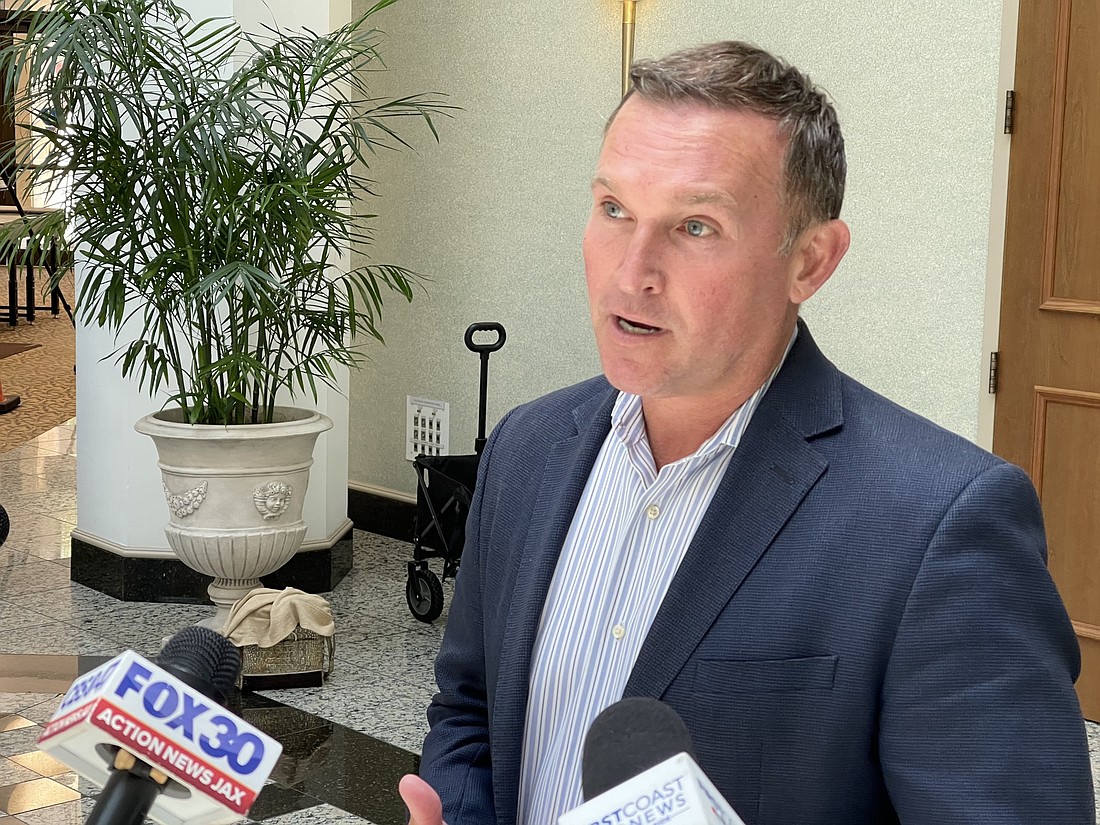
After the Jacksonville City Council passed Mayor Lenny Curry’s proposed increase to Duval County’s local option gas tax May 25, he acknowledged to reporters gathered in the City Hall rotunda that no tax hike is popular with voters.
“Today’s a historic day for our ability to invest in much-needed infrastructure in our city,” Curry said.
“We’ve neglected this stuff for years and we need a source of revenue.”
The Council voted 14-5 to approve Ordinance 2021-223 that will double the gas tax from 6 cents per gallon to 12 cents, starting Jan. 1, to complete nearly $1 billion in road, drainage and other infrastructure needs.
The bill includes money for the 30-mile urban neighborhood Emerald Trail network and the Jacksonville Transportation Authority to modernize the Downtown Skyway.
The list of eligible projects filed with the legislation includes $483 million for road, bridge, drainage and gutter repairs.
The project list also includes $102 million for 3,682 miles of countywide road resurfacing.
JTA also would make more than 800 bus stops fully compliant with the Americans with Disabilities Act and buy a second St. Johns River Ferry, among other needs.
The bill splits the additional 6 cents and the project list between the city and JTA.
Curry, Council President Tommy Hazouri and JTA branded the tax increase as the Jobs for Jax program, stating it would create 7,640 construction jobs.
Curry said the economic benefit will go beyond the initial employment.
“Other companies will see that we are serious in investing in our city and our neighborhoods,” Curry said.
“I think that will attract more jobs and more businesses and more people wanting to move to our city.”
Council members Danny Becton, Randy DeFoor, Rory Diamond, LeAnna Cumber and Al Ferraro voted against the 30-year gas tax. A University of North Florida poll released May 18 showed that 58% of Duval County residents opposed the increase.
Those in support were Council members Hazouri, Matt Carlucci, Aaron Bowman, Michael Boylan, Garrett Dennis, Terrance Freeman, Reggie Gaffney, Joyce Morgan, Sam Newby, Ju’Coby Pittman, Brenda Priestly Jackson, Ron Salem, Randy White and Kevin Carrico.
There was no debate May 25 on a companion bill to use general fund money freed by the gas tax to boost spending by $100 million on failing septic tank removals in underserved neighborhoods.
Council approved that bill 18-0.
Supporters of both looked at the bills as a chance to address the city’s long list of capital improvement needs more quickly.
“We are coming and taking the step to be the ‘Bold New City of the South’ ... and not an old city of the South,” Carlucci said.
Skyway survives
The $247 million line-item for JTA’s Skyway modernization, the Ultimate Urban Circulator, survived a push by DeFoor to remove it from the final bill.
JTA CEO Nat Ford says the gas tax revenue will be used to convert the Skyway’s existing elevated monorail track into a roadway for autonomous vehicles and connect to the street level Bay Street Innovation Corridor that extends the transit system to TIAA Bank Field.
The money for the U2C ultimately pushed DeFoor to vote against the final bill, despite voting to advance it in the May 19 Committee of the Whole and acknowledging what she sees as Jacksonville’s need for infrastructure investment.
The Council voted May 12 to cut $132 million from the $379 million for the U2C in the original version of Ordinance 2021-0223 and redirect it to the multiuse Emerald Trail project.
DeFoor said no one at her District 14 town hall meeting last week supported paying for the U2C with the gas tax.
“Our city has underinvested in itself of years and there’s no cheap path to greatness for any city,” DeFoor said.
“Jacksonville faces an existential moment but an existential moment is not a blank check.”
Three Council members — Cumber, Ferraro and Carrico — joined DeFoor in opposition to the U2C money.
Many Council members, including White and Salem, said their faith in the U2C is tied to Ford’s ability to execute projects.
Ford said in an interview after the vote that, with the $247 million local funding in place, JTA will lobby the federal government to fund the neighborhood extension.
He called the U2C “a sound investment.”
“The U2C project is the future and it needs to be in place to prepare for all of the Downtown development that is already happening right now,” Ford said.
According to Ford, the U2C will produce nearly half of the jobs created by the gas tax.
“We also expect a great deal of companies to come and support our project,” he said.
“There’s going to be indirect jobs and opportunities that are created. And then we’re setting up a tech academy within the JTA to specifically partner with (Duval County Public Schools) and different community organizations that are helping to develop children.”
Emerald Trail
The bill also gives JTA the responsibility to work with the lead organizer, the nonprofit Groundwork Jacksonville, to engineer and build the Emerald Trail, which will encircle Downtown and adjoining neighborhoods with paths and green space.
Ford told the Council he expects that JTA contractors could break ground on the next legs of the trail within a year. He said borrowing against JTA’s gas tax revenue could move the project more quickly.
JTA’s board is scheduled to meet May 27 with Groundwork Jacksonville to discuss the design scope and begin working toward a development agreement.